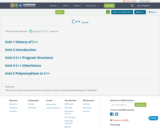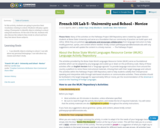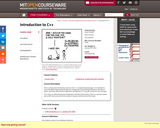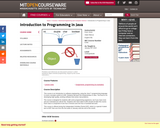
This course content provides the basic concepts of object oriented programming in C++language
- Subject:
- Career and Technical Education
- Material Type:
- Full Course
- Date Added:
- 07/05/2016

This course content provides the basic concepts of object oriented programming in C++language

This is a foundation subject in modern software development techniques for engineering and information technology. The design and development of component-based software (using C# and .NET) is covered; data structures and algorithms for modeling, analysis, and visualization; basic problem-solving techniques; web services; and the management and maintenance of software. Includes a treatment of topics such as sorting and searching algorithms; and numerical simulation techniques. Foundation for in-depth exploration of image processing, computational geometry, finite element methods, network methods and e-business applications. This course is a core requirement for the Information Technology M. Eng. program.
This class was also offered in Course 13 (Department of Ocean Engineering) as 13.470J. In 2005, ocean engineering subjects became part of Course 2 (Department of Mechanical Engineering), and the 13.470J designation was dropped in lieu of 2.159J.

In this activity, students are going to practice vocabulary relating to school. Students will play a game using a slideshow to identify objects relating to school using full sentences. At the end of the activity, students will also discuss the subjects they study in school and how they feel about those subjects.

In this activity, students will discuss and answer questions about classes and school. They will also practice their school-related vocabulary and identify objects in French.

This course will provide a gentle, yet intense, introduction to programming using Python for highly motivated students with little or no prior experience in programming. The course will focus on planning and organizing programs, as well as the grammar of the Python programming language.
The course is designed to help prepare students for 6.01 Introduction to EECS I. 6.01 assumes some knowledge of Python upon entering; the course material for 6.189 has been specially designed to make sure that concepts important to 6.01 are covered.
This course is offered during the Independent Activities Period (IAP), which is a special 4-week term at MIT that runs from the first week of January until the end of the month.

This is a fast-paced introductory course to the C++ programming language. It is intended for those with little programming background, though prior programming experience will make it easier, and those with previous experience will still learn C++-specific constructs and concepts.
This course is offered during the Independent Activities Period (IAP), which is a special 4-week term at MIT that runs from the first week of January until the end of the month.

This is a fast-paced introductory course to the C++ programming language. It is intended for those with little programming background, though prior programming experience will make it easier, and those with previous experience will still learn C++-specific constructs and concepts.
This course is offered during the Independent Activities Period (IAP), which is a special 4-week term at MIT that runs from the first week of January until the end of the month.

Ever hang your head in shame after your Python program wasn’t as fast as your friend’s C program? Ever wish you could use objects without having to use Java? Join us for this fun introduction to C and C++! We will take you through a tour that will start with writing simple C programs, go deep into the caves of C memory manipulation, resurface with an introduction to using C++ classes, dive deeper into advanced C++ class use and the C++ Standard Template Libraries. We’ll wrap up by teaching you some tricks of the trade that you may need for tech interviews.
We see this as a “C/C++ empowerment” course: we want you to come away understanding
why you would want to use C over another language (control over memory, probably for performance reasons),
why you would want to use C++ rather than C (objects), and
how to be useful in C and C++.
This course is offered during the Independent Activities Period (IAP), which is a special 4-week term at MIT that runs from the first week of January until the end of the month.

This course is an introduction to software engineering, using the Java™ programming language. It covers concepts useful to 6.005. Students will learn the fundamentals of Java. The focus is on developing high quality, working software that solves real problems.
The course is designed for students with some programming experience, but if you have none and are motivated you will do fine. Students who have taken 6.005 should not take this course. Each class is composed of one hour of lecture and one hour of assisted lab work.
This course is offered during the Independent Activities Period (IAP), which is a special 4-week term at MIT that runs from the first week of January until the end of the month.

This course is an introduction to software engineering, using the Java™ programming language. It covers concepts useful to 6.005. Students will learn the fundamentals of Java. The focus is on developing high quality, working software that solves real problems.
The course is designed for students with some programming experience, but if you have none and are motivated you will do fine. Students who have taken 6.005 should not take this course. Each class is composed of one hour of lecture and one hour of assisted lab work.
This course is offered during the Independent Activities Period (IAP), which is a special 4-week term at MIT that runs from the first week of January until the end of the month.

Political Economy I explores the major social science paradigms for analyzing relations among state, economy, and society. Through readings, lectures and discussion of original texts in political liberalism and individualism, neo-classical economics, Marxism, sociological and cultural theories, and neo-institutionalism, the seminar examines the fundamental assumptions on which our understanding of the social world and our research are based.